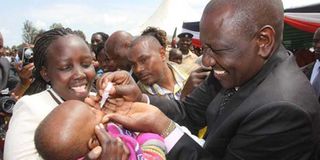Polio vaccination begins despite protest by Catholic Church

Deputy President William Ruto administers a polio vaccine to seven-month-old Shantel Chepkorir at Ngeria Girls Secondary School in Kapsaret Constituency on August 1, 2015. The polio vaccine currently being administered to children under the age of five is safe, the National Quality Control Laboratory has said. PHOTO | JARED NYATAYA | NATION MEDIA GROUP
What you need to know:
- The campaign will run in two phases, with the first scheduled for August 1 to 5 and the second for August 29 to September 2.
- Despite the numerous assurances, the Catholic Church maintains that the vaccines are not safe.
- Polio is an infectious disease caused by a virus that lives in the throat and intestinal tract.
- The disease mainly affects children under the age of five.
Nearly six million children in 32 counties will be vaccinated against polio despite the Catholic Church asking parents to boycott the exercise over the safety of the vaccine.
The counties were selected after a risk analysis in January this year of the most at risk of polio and those that have mobile population.
The study showed that nearly 66 per cent of the population and particularly children were most at risk of the viral infection.
The campaign will run in two phases, with the first scheduled for August 1 to 5 and the second for August 29 to September 2.
The Ministry of Health yesterday launched the first round of the vaccination in Gilgil Town, Nakuru.
And perhaps to address concerns raised by the church about the safety of the vaccine, the ministry put up two adverts in yesterday’s dailies to educate the public on the importance of the vaccine.
Health Principal Secretary Khadijah Kassachoon accused the Catholic Church of spreading falsities.
Speaking in Gilgil Saturday, the PS said the drugs are safe and requested the church to support the state in ensuring the campaign is a success.
“The Ministry of Health wishes to assure all Kenyans that the vaccine being used during the polio vaccination is safe and effective,” said Ms Kassachoon.
She said the vaccine are prequalified by the World Health Organisation (WHO) and sourced by the United Nations Children’s Fund (UNICEF).
In one of the adverts, the Pharmacy and Poisons Board detailed the process the government undertakes to procure the drugs, assuring the public that the polio vaccine is safe and of good quality.
Despite the numerous assurances, the Catholic Church maintains that the vaccines are not safe.
“It’s unfortunate that they can pay for adverts yet the vaccines are contaminated, we conducted tests in April this year and I saw it with my own eyes,” said the chairman of the Catholic Church Health Commission Dr Stephen Karanja.
Speaking to the Nation by phone Saturday, Dr Karanja could however not state which labs conducted the tests, or the samples used.
“The ministry should present to the public their research and when they do, we will present ours to counter their findings.”
The controversy is similar the one that happened late last year when the Catholic Church raised a storm over the tetanus vaccination which they claimed can cause sterility in women.
Similarly, Dr Karanja says the polio vaccine which “is not like the ones used for the routine vaccination exercise and available in any hospital” is “laced with an active ingredient, a hormone that if injected to children - male or female - it will affect their growth and reproduction abilities.”
On Friday, a polio campaign ambassador Clinton Werema filed a case through his lawyer Fred Athuok at the High Court to bar the Catholic Church from issuing statements against the campaign pending hearing and determination of the case.
At the same time, Manyatta MP John Muchiri who is also a member of the National Assembly Health Committee has urged the Health ministry to postpone the polio vaccination drive, until concerns raised by the Catholic Church are addressed.
He spoke in Embu, stating: “If the church has issues with the vaccines, it is good to listen.
When the church speaks, it speaks on behalf of many people; it is good to give them room to see if the vaccine is good.”
Polio is an infectious disease caused by a virus that lives in the throat and intestinal tract.
It is often spread through contact with the stool of an infected person. It can also be spread through oral or nasal secretions.
The disease mainly affects children under the age of five.





